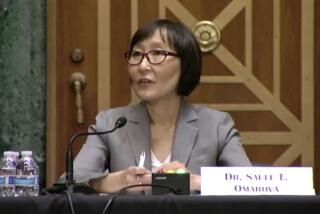Comptroller of Currency Will Resign Post in Spring
- Share via
Comptroller of the Currency C. Todd Conover, whose commitment to banking deregulation and his approval of “non-bank banks” led to stiff criticism from Congress, said Tuesday that he will resign this spring to take a job in private industry.
Conover’s term as supervisor of the nation’s 4,700 federally chartered commercial banks was to have run through 1986. “The time has come for me to move on to something else,” Conover told a news conference in Washington. “I don’t know specifically what I’m going to be doing, but I’m sure I’ll find something interesting to keep me busy.”
His announcement came just two hours after President Reagan said Treasury Secretary Donald T. Regan would trade jobs with White House Chief of Staff James A. Baker III, but Conover said that change played no role in his decision.
Conover, 44, said he had considered resigning for several months and had discussed the matter with Regan in December.
While giving no specific reason for his decision to leave, Conover said he had accomplished as much as he could. “The opportunities for future deregulation get to be fewer and fewer. . . . There’s no longer the big barrel of opportunities that existed two years ago.”
He expressed frustration in dealing with a Congress reluctant to overhaul banking laws and indicated that he would foresee no change in that situation if he fulfilled the remainder of his term.
Limited-service non-bank banks avoid certain federal restrictions either by not making commercial loans or by not accepting checking accounts. (A bank, as defined by federal law, does both.) This distinction has enabled non-banking companies, such as securities firms, to get a foothold in some banking activities and enabled banks to get around laws prohibiting interstate branching.
People on both sides of the issue, however, acknowledge that the non-bank banks--many of them formed by giant bank holding companies such as Citicorp--are taking advantage of a loophole in the law and that there is no indication Congress envisioned what is now happening when the law was written.
Conover declared a moratorium in April, 1983, on hundreds of pending non-bank bank charter applications to give Congress time to close the loophole. After two extensions, Conover lifted the moratorium in October, declaring that Congress’ failure to act compelled him under existing law to resume action on the applications.
Conover said Tuesday that he is not so much interested in preserving non-bank banks as he is in forcing Congress to act on an omnibus overhaul of the nation’s banking laws.
“It would be a shame to deal with the non-bank bank issue simply by closing the loophole,” he said.
“I don’t know what kind of crisis has to occur to get these people to act,” he said. “Congress has got to get into the act, look beyond the special-interest lobbies and do what is right.”
Conover’s departure as comptroller and as one of three members of the Federal Deposit Insurance Corp. board means that President Reagan will likely be appointing three new members to the FDIC governing body.
FDIC Chairman William M. Isaac, who worked closely with Conover on developing solutions for banks threatened with failure, has already said he intends to leave his post, although he has not set a date. The third director, Irvine H. Sprague, is expected to leave at the end of his term later this year.
More to Read
Sign up for Essential California
The most important California stories and recommendations in your inbox every morning.
You may occasionally receive promotional content from the Los Angeles Times.













